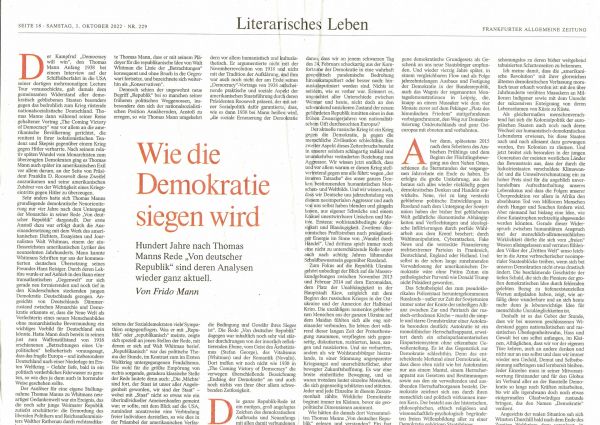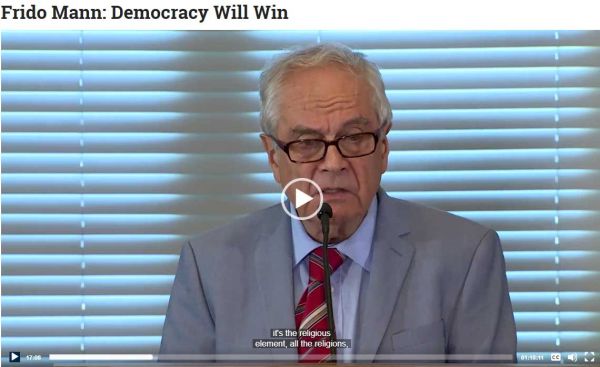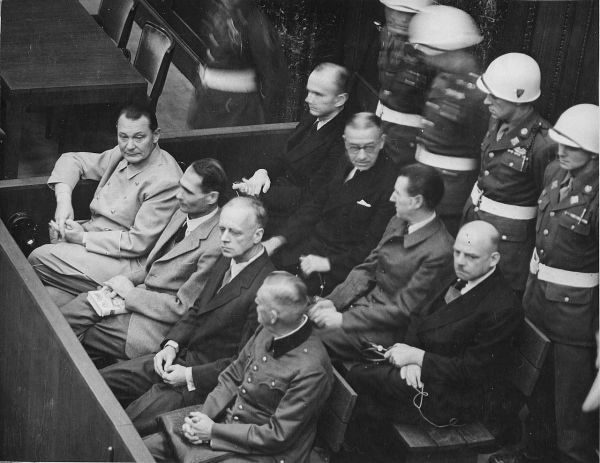Democracy Will Win! Won't It?
Democracy Will Win! Won't It?
From the Frankfurter Allgemeine newspaper: "How Democracy Will Prevail," by Frido Mann
Frido Mann, the grandson of German writer Thomas Mann, bases this article on his father's own proclamations, delivered in the U.S. during war-time. Thomas Mann had written critically about Nazi-Germany since the mid-thirties, and he had a Jewish wife. Mann warned that the U.S. could only save the democratic nations of Europe if it dropped its isolationist stance and entered the war against the Nazis.
Frido Mann writes that his father had grown up in Germany when it was still a monarchy, and he struggled with Germany's converting itself into a democratic republic. He came round to the idea gradually, and by the time he reached the United States in 1936, he had become a spokesman for a return to democracy in Germany.
Unfortunately, no one—not the Americans who sponsored Mann's address, nor Mann's grandson—bothered to mention that Germany already had a democracy when it elected Hitler, nor did the Manns supply the key-word in this situation, a constitution. Germany had one of those, too, the Weimar Constitution; but the Weimar Constitution emphasized tolerance, fairness, and the right of women to vote, at a time when it needed to create a functioning society with structure and limits, that created wealth and moved it forward.
The world blamed Germany for choosing Hitler, but the Inter-War years in Germany were already pretty strange, with France occupying the Ruhr Industrial Area and demanding huge reparations—with the German economy already on the ropes from the Great Depression, and 25% of the work- force jobless. Nobody mentioned the legal term Force Majeure in defining Germany's culpability, whether the subsequent poverty and disorder should mitigate its culpability.
Certainly democracy did not prevent the empowerment of the Third Reich. On the contrary, it gave the Third Reich its necessary constitutional legitimacy. Never mind that Hitler showed his hand in 1925 irrevocably when he published his personal manifesto Mein Kampf (My Battle). In Mein Kampf, Hitler revealed his pathological hostility to Jews, his hunger for revenge against France and the Versailles Treaty, and his readiness to put Germany on a war-footing and increase its living-space.
The fact that thousands of German voters bought Mein Kampf, then ignored Hitler's mindset and intentions to start a war, suggests that returning to a democracy will not help matters very much. Frido Mann's day-dreams of an educated, judicious German populace hardly touch the ground. Even educated, informed people ignore the prevailing apathy and inertia in democratic societies.
When Americans first saw the film-footage of soldiers leading German citizens through the Death Camps, they murmured "They knew!" meaning that average Germans knew about the camps and did nothing. As a child, I heard it often: "They knew!" Well, maybe they should have known, but you could say the same about the Jews, themselves. "They knew!" The Jews knew what the Nazis were up to and did nothing. That collective inertia plagues the people in every nation and diminishes our awareness of what is really going on. Don't count on democracy fixing anything big that's wrong!
Nuremberg Trials. Defendants in their dock, circa 1995-1996. (in front row, from left to right): Hermann Göring, Rudolf Heß, Joachim von Ribbentrop, Wilhelm Keitel (in second row, from left to right): Karl Dönitz, Erich Raeder, Baldur von Schirach, Fritz Sauckel
The only secure foundation for the establishment of a nation is its constitution. A constitution gives a nation its legal foundation. In fact, no matter what complaint people makes about the legality of the War-Crimes Trials convened by the Allies after the defeat of Nazi-Germany, the Trials did bring the Western World back from the brink of barbarity; and it did it by in a basically pedestrian courtroom setting, presided over by judges, with defense attorneys and prosecutors offering evidence. The prosecutors supplied vital evidence against the defendants in the form of paper-trails and eyewitness testimony. Applying democratic principles to it would have resulted only in an on-again, off-again kangeroo-court kind of justice.



